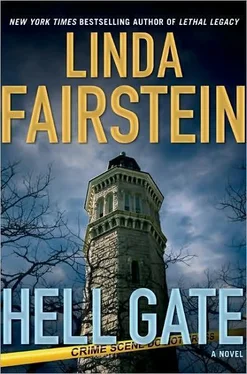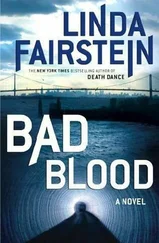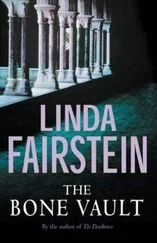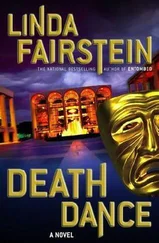“Right here,” the man said, pointing to the back steps.
Mike led me up and the door was opened by the detective from the mayor’s detail-the same one who had been with him and Rowdy Kitts when Statler stormed into the mansion on Thursday afternoon, after Salma’s body had been recovered from the well.
Mike shook his hand and said hello. “You know Coop?”
“Only by sight,” he said. “I’m Dan Hardin. Pleased to meet you.”
If he was pleased about anything, it wasn’t reflected in his expression.
“Alex Cooper. Thanks.”
“The mayor’s waiting for you in the dining room. He’s just finishing lunch.”
We followed Hardin up a short interior staircase, lined with a rich bright-blue-and-gold runner, which spilled into an enormous ballroom.
“This is the Wagner Wing, isn’t it, Dan?” Mike asked.
“Yeah.”
“What do you mean?” I asked.
“It’s named for Susan Wagner, the wife of Robert Wagner Jr.,” Mike said, “who was elected in 1953. She hated everybody tromping through the mansion, putting out cigarettes on her carpet and parking cocktails on her furniture. All this big reception space was built for public functions in the 1960s. It’s not original to the mansion.”
Dan took us down a hallway that opened on the dining room.
The mayor was alone at the head of the antique mahogany table, surrounded by several piles of paper. He had a thick report of some kind in his left hand.
I had been there with Jake for dinner and knew that the room could accommodate dozens of people. The furnishings were exactly as I remembered them-exquisite period pieces like the paw-footed sidebar, a dazzling brass chandelier, green moiré curtains, and the exquisite panorama of Paris on wallpaper that covered the four sides of the room.
“Here they are, Mr. Mayor.”
“Oh,” he said looking up from his work. “Come in, Alex. Mike. I’m just finishing up here. Would you like the chef to fix something for you?”
“No, thanks, sir,” I answered.
“Don’t be shy. We keep these going all day.” Vin Statler was pointing at a stack of tea sandwiches. “English cucumbers, Mike. Give them a try. Chef Estevez makes the world’s best chocolate chip cookies. Even Mother Teresa thought so. Four thousand a week we make for guests and tours. You know in the summer we grow a lot of things in our own garden-right down past the well. Romaine lettuce, eggplant, Brussels sprouts, chives.”
“I didn’t think you called us here for an Iron Chef throw-down, Mr. Mayor,” Mike said.
“I understand you’re interested in the mansion, Mike.” Statler’s plastic smile changed to a momentary scowl. “I’ve got all the information you might want to know, and you may have something for me.”
“No free rides, sir. I’m aware of that. I was hoping we could look around.” Mike was still determined to find a reason that Salma’s body had wound up on the grounds of this unusual home.
“We’ll show you the place. I expect that will put your mind at ease, convince you the mansion has nothing to do with anything so sordid,” Mayor Statler said. “Roland tells me you’re quite the history buff, Detective. And you, Alex, you’ve been spending time in France I understand. You know Zuber?”
Mike’s brow furrowed at the mention of a name he didn’t know. He hated to be left out of the loop.
“Yes, sir. I’ve seen this room before, but never without a crowd in it,” I said.
“Take a good look. It’s remarkable, isn’t it.”
“I’ll bite,” Mike said. “What’s a Zuber?”
“Jean Zuber ran a company in Alsace, Detective, that was set up in the early nineteenth century. The crème de la crème of French artistry.”
Mike was running his hand over the smooth surface of an antique pier table. “What’d he make?”
“Wallpaper.”
“You could get rich from wallpaper?”
“This is the grandest quality in the world, Mike,” I said. “These panoramic scenes were printed on hand-carved pear-wood blocks. Les Jardins Français, isn’t it?
“Yes, Alex. Made in 1830.” The stunning painting of French gardens covered the room, like a colorful montage of trees and flowers and fountains. “That was the height of the craze for French wallpaper of this quality. It was before photography, so people would pay to have these foreign scenes created in their homes.”
“Flocking. My mother was more partial to flocking,” Mike said.
“This would have cost a fortune to re-create today. Beyond our means,” Statler said, ignoring Mike completely. “But the decorators just happened upon it in the attic of a grand Hudson Valley house, unused and in its original wrapping. Did you know Jackie Kennedy found two Zuber panoramas to place in the White House?”
The mayor was finishing his coffee. Mike poured us each a cup and helped himself to the cookies.
“No,” I said, “I didn’t.”
“We got very lucky. We’d never have afforded this one.”
“Ninety percent of police work is getting lucky,” Mike said. “Glad it happens under your roof too.”
“But there was a fortune spent on restoring this house, wasn’t there?” I asked.
“Indeed,” the mayor said to me, then turned to Dan Harkin. “Want to ask someone in the kitchen for hot coffee?”
Statler pushed back from the table and stood up. “Parts of the house were falling down by the time Ed Koch moved in. Almost uninhabitable. By 1983, he’d raised private money-millions-to establish a conservancy for Gracie Mansion, to get down to the foundation and rebuild the entire structure.”
“That must have been quite a process,” I said. Statler clearly wanted to be stroked, to show us he was in charge of the “people’s house,” before he turned it over to us for examination.
“You can’t imagine what they did. Everything from infrared scanning to determine the posts and beams of the original wooden framing, biopsies-really, biopsies-of old paint chips to try to match the original colors.”
“It was renovated again in 2000, wasn’t it?” Mike said.
“It’s very hard to maintain something as old as this building. Despite the earlier work, the deck on the front porch almost collapsed. At the time, there was an anonymous gift to the conservancy here for five million dollars.”
Mike whistled. “That could buy a lot of Zuber.”
“There was a great effort that went into finding some of the original pieces the Gracie family owned, furniture made for the house when the Gracies lived here.”
“Nice job. Bloomberg, huh?”
Statler bristled at the sound of his predecessor’s name. “Anonymous, I said.”
“We all know what that guy did for the city,” Mike said. “Every decent charity and every great cause got an anonymous handful from his deep pocket. The guy is aces.”
Statler clearly didn’t like Mike’s admiration of the popular politician who had preceded him in the post.
“When did Gracie Mansion become the official mayoral residence?” I asked.
“The country’s first official mayoral residence, Alex,” Statler said. “At the insistence of Robert Moses, who was the very powerful parks commissioner, Fiorello LaGuardia reluctantly gave up his own comfortable apartment and moved in here, to the farm, as he liked to call it. Nineteen forty-two was the year.”
Mike was getting antsy. “How come so many of you guys don’t want to live here?”
“Each mayor, each family, has its own reaction to the house. You know we had a district attorney who became mayor, Alex, do you?”
“No, I didn’t know that.”
“Nineteen forty-six, Bill O’Dwyer,” Statler said. “He’d been the Brooklyn DA.”
“Prosecuted the Murder, Inc., guys,” Mike said. The media had given the thriving organized crime group known as Brownsville Boys, who’d been responsible for scores of murders from the 1920s to the 1940s, their more vibrant name.
Читать дальше












